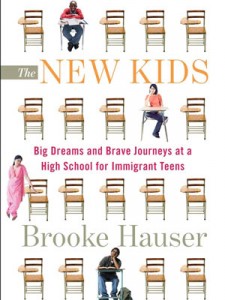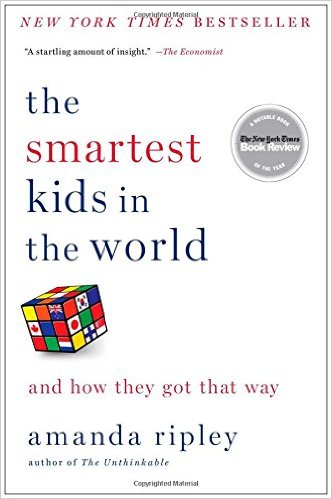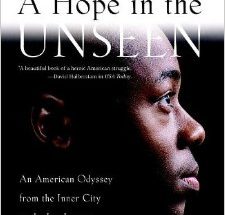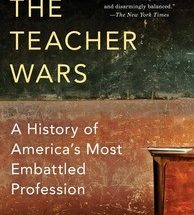Q & A with Brooke Hauser, author of The New Kids: Big Dreams and Brave Journeys at a High School for Immigrant Teens
Interview conducted and condensed by Larry Tung
Brooke Hauser spent a year following students at Brooklyn’s International High School at Prospect Heights. The New Kids features heartwarming, humorous and inspirational glimpses at the unique lives of America’s young immigrants. (Free Press)
Q: One of the most difficult parts of the job of education reporter is getting access to schools. How did you convince the school to allow you into the school?
It was easy enough to gain access to the school for one article. The [New York Times] article helped tremendously when it came to gaining access for the book.
The Internationals Network for Public Schools oversees the international high schools. There are more than a dozen of them. Most of them are in New York. Two are in California. They are public schools and are associated with the DOE. But they also have their own network. The network was very helpful. I would never promise anyone that it would be a favorable story. But my angle was to write about the first ever prom in the international high school, a school where the students are from all over the world and that topic in itself did not sound threatening.
In addition, my initial reporting for the article did not really happen during school hours. The students met after school for prom committee meetings, so it made more sense for me to be there after school hours. It was a sweet article. There were sad moments to it, but it portrayed the school in a positive light. The school was happy with it and the principal was happy with it. And they trusted me. They saw how I dealt with the students. With some of the refugee students, you have to be careful when you dig around their stories. You don’t want to be crass and call up difficult memories, then just use it for a quote and disappear.
When I started working on the book, the DOE gave me consent forms for the students’ parents or guardians. Every student whom I featured by name or prominently in the book signed a release form. The form was translated into many languages because they really wanted people to understand that they are going to be in a book.

Q: How did you find out about the prom?
A: A friend of mine volunteered for the International Rescue Committee, which is the agency that settles refugees in this country. She was working with the students from the Bronx International High School, and I thought I’d like to do some volunteer work as well. So I called the network and found that there is an international school in Prospect Heights, which is near my home at the time in Park Slope. I chose the school because it is convenient for me. I knew I wanted to be there every day. Once I found the school, I knew that I like the idea of a world inside of a high school, a school where the kids come from 45 countries and speak more than 28 languages, I thought, “What is the quintessential experience of an American high school tradition?” It was prom! I knew I am interested in the school, and they knew I needed an angle. And prom seemed to be the most fun.
Q: Do you always cover education or immigration?
A: Neither. I would say that I am always interested in immigration and stories of newcomers. I worked at the Tenement Museum on the Lower East Side when I was in college. But something that really helped me is that I am not an education writer per se. I was attracted to the school not because of its politics, policies or education agenda, but because of the stories of the students. The book does touch on issues like the Dream Act. It definitely gets into ELL education, but it is through the students that those issues were brought to light.
Q: How did you identify the characters?
A: In September, I approached most of the 12th grade teachers. I asked them, “When you go home at night, who are the students you can’t stop thinking about?” Some of the kids are going through such difficult times. Their stories were still in their teachers’ minds when they left at 3 o’clock. For instance, one student was Jessica Tan, who just came from China. Her teacher, Ann, couldn’t believe that she was so together in her English class. Such an excellent student was going through a tumultuous time at home. She wondered about Jessica at night. For another teacher, James Rice, that student was Yasmeen, who lost both her parents. For these teachers, their workday didn’t end when they went home. They were thinking about these kids, worrying about them. That’s how I found Jessica and Yasmeen. The teachers were so helpful because they have known the students for several years.
The other thing I did was to read their college essays. That’s how I discovered Ngawang and Mohamed. Chit Su was the most random. I knew I wanted to follow a brand new student. I wanted a student who preferably came from a more obscure country because I thought it would be more difficult. They would not be able to identify with other speakers of their language. It seemed out of nowhere that Chit Su appeared. And sure enough she is the only one who speaks Burmese. What is it like to be the only person to speak your language? She found the bathroom but she couldn’t unlock the stall. All these little moments that can be totally overwhelming when they start stacking up.
Q: Do you still keep in touch with the kids?
I gave the commencement speech in 2011 and Mohamed introduced me. We’ve been in touch. Jessica and I e-mailed just the other day. Yasmeen and Ngawang, too. Chit Su used to call me on my cellphone on the holidays but she stopped calling. Last I heard from her, she is in Chicago. She kind of fell off the radar.
I am at a stage where I am going to a lot of readings and events. People are always asking, “What’s the update?” When I met those kids, we talked about how I would follow them for a year or two years through the end of writing the book and the epilogue. I know what the updates are. I know the new developments in their lives. But I am just trying to figure out how comfortable I feel about sharing the information. For now, I am really just keeping them to myself. It’s nice to be able to talk to the kids and not have to report on every single detail. A lot of times, they are telling me things in a personal email.
Q: You spent a year covering the school, so you must have a lot of notes. How do you keep them organized?
A: I was extremely organized. An editor of mine warned me in the beginning that I should have a grid or some kind of system to organize my notes. I started a Microsoft Word file on my computer. I have a Word document for every month that I was in the school. Every day I would go to the school and took tons of notes in my reporter’s notebook. Sometimes I would use my recorders for longer interviews. Then I would come home and transcribe my notes into a Word document. I did that almost every day for a year.
I put all the typed notes into a binder. If I didn’t have time to do other notes, I photocopied them out of my notebooks and put them in another binder labeled “written notes.” I created tables of content for both sets of notes so I could glance over quickly. I would have little summaries of the major things that happened in each month for each binder. Because I was super paranoid, I made copies of these binders. By the end of the process, I had two copies of the typed notes and two copies of the written notes. I kept each set of binders in different places. When you are writing a book, you want that information at your fingertips because you accumulate so much stuff. The harder thing was transcribing all of the tapes. I did most of them and labeled them. I had a system for tapes. I also took videos. I had many different ways of organizing and checking things. It drove me nuts but it also saved me a lot of work.
Q: What are you working on right now?
A: I am working on having a baby in six weeks. There is a possible book idea on the horizon that would involve less intensive reporting. It’s more research-based because I am going to have a baby so I am looking for a project that would allow me to research and write. But I am not going to mention the subject until I’m really sure.
Also, I recently moved to North Hampton, Massachusetts. And I just taught my first writing course at Smith College. I’d love to do more teaching. In addition to the more investigative journalism that I do, I write a lot for Allure magazine interviewing celebrities. I was doing that while doing reporting at the school. It was pretty hilarious to be interviewing Julia Roberts one week and the next week be with the kids back at the cafeteria.
Q: Any tips for aspiring education reporters?
A: Look for good stories. Readers care more about the stories and characters than the issues. The stories and characters will make them care about the issues. It’s true in every area of journalism that you make people care about an issue by making them care about a person or a story.



